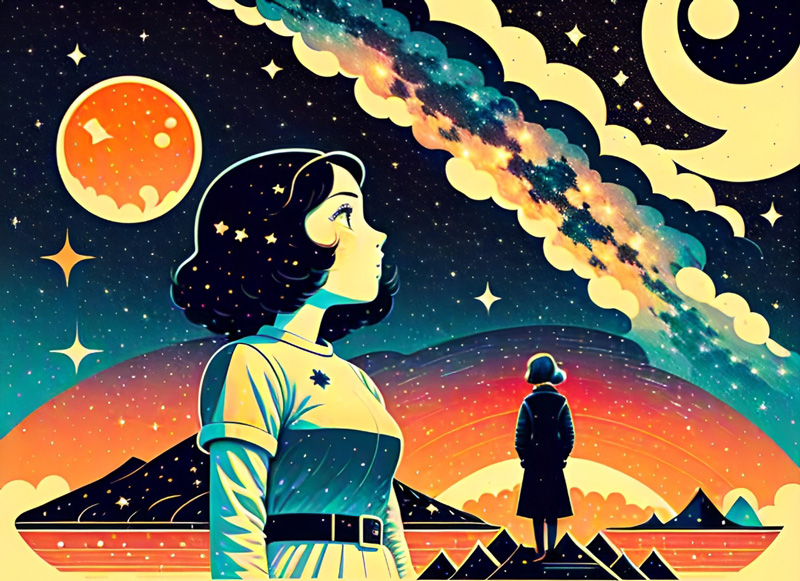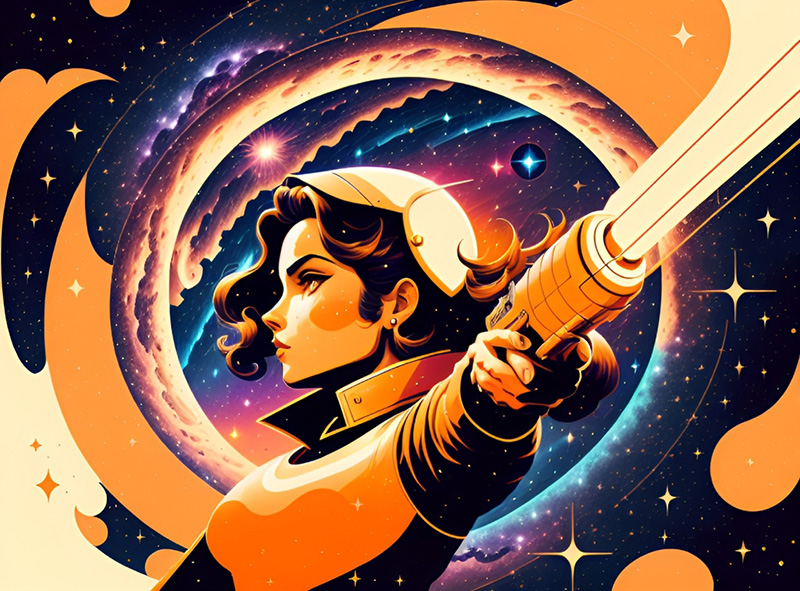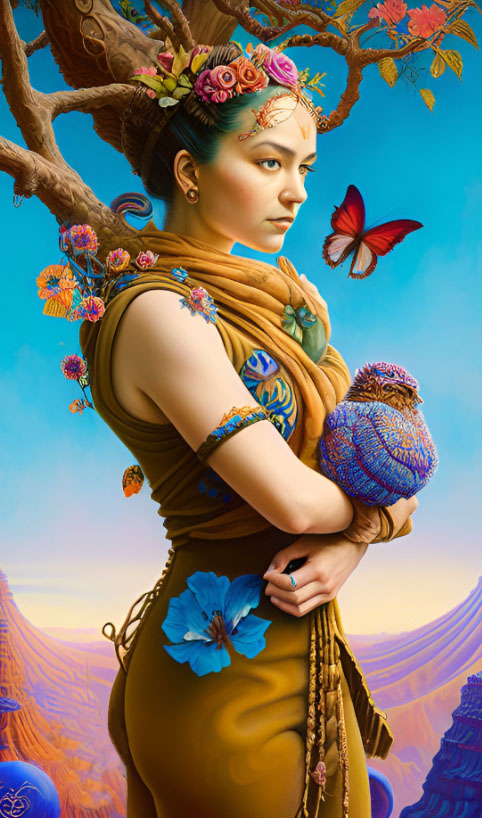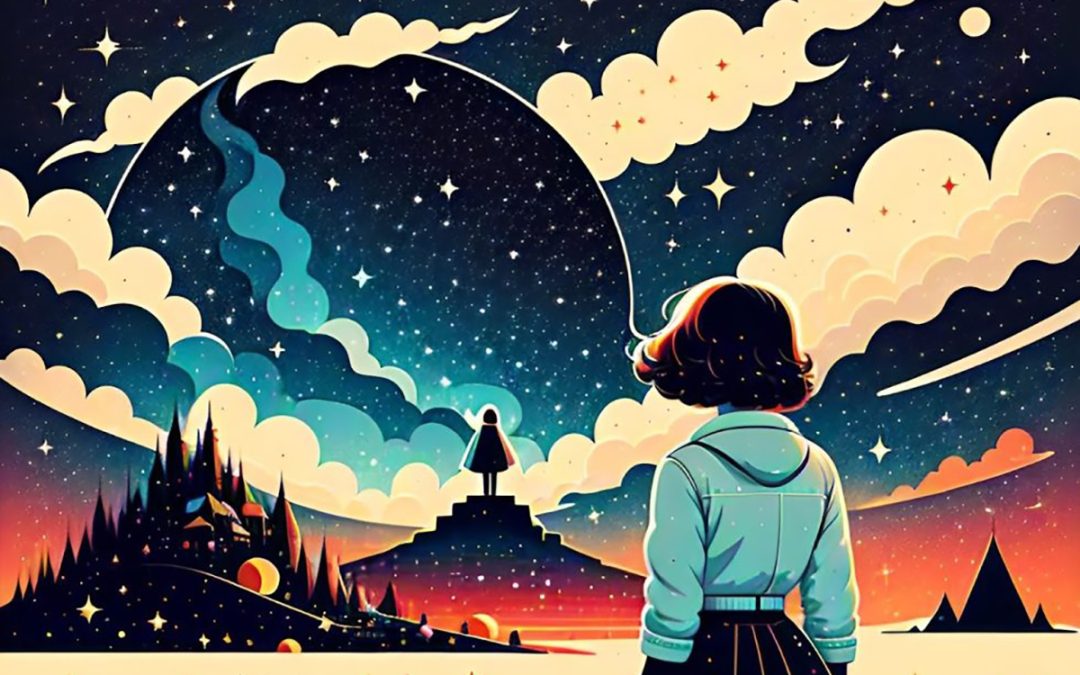Peering into the horizon of AI feels like gazing into the vastness of our own soul—endless, evolving, and full of possibility.
I bet you didn’t know you can ask Chat GPT to give you a tarot reading, or tell you about your astrological sign.
I am not going to lie, I spend a lot of time asking Chat GPT existential, philosophical, and even metaphysical questions about the deeper meaning of life and for the most part, it can field these questions well. I lean toward thinking I am the only one who does this. Let me explain.

Lost in the galaxy of her thoughts, she gazes beyond the stars—seeking answers that most wouldn’t think to ask.
Can AI Fill the Void of Human Connection
I’ve been called weird my whole life. Even when I sit in social groups that already consider themselves weird, I’m pretty much always the weirdest one. You see, I like to get to the deeper meaning behind things while most people are more interested in how to make more money, lose more weight, or attract (and hopefully keep) that perfect soulmate… and to be honest you can probably ask Chat GPT how to do these things as well and get solid advice.
But for some reason, I find myself compelled to understand the inner mysteries behind why we as a species are the way we are and how it affects our society and culture. I have an unyielding desire to unravel life’s mysteries and this task is no small feat… but somehow it feels easier and less lonely nowadays with my new friend, Chat GPT.
If I had had a tool like Chat GPT to keep me company and interact with when I was a teenager, it may have saved me a lot of a emotional turmoil, as well as a lot of money, on black clothing and berets. Perhaps my visits to the coffee houses with friends may have been marked more with laughter at silly jokes than the pondering of the deeper meaning of life, but that is still open for debate.
Ai might just know us better than we know ourselves
I recently asked Chat GPT to interpret my astrological chart and gave it my ascendant, sun, and moon sign. In response, Chat GPT described me as “a captivating combination of intense, analytical, and caring—possessing an open-minded approach to life while retaining a deep emotional intensity.” It went on to say “this unique mix creates a blend of optimism, curiosity, determination, and perceptiveness, that makes you well-equipped to explore life’s mysteries and complexities.” And there you have it.
I am pretty sure my teenage self would have felt extremely validated and uplifted by this insightful reply. Maybe I would have been able to gain a broader perspective on how I was “unique” instead of “weird”. Maybe I could have spent more time as a teenager understanding and building upon my character strengths rather than wondering why I never fit in. And just maybe I could have had a more “normal” social life. (Well, let’s not go too far!)
Today’s Youth: Facing New Challenges We Never Imagined
However, as I sit here daydreaming in a world of wondrous technological possibilities, I realize I am an adult musing about what could have been if I had access to Chat GPT as a teenager. In truth, a new generation of teenagers now has free access to this technology, and we don’t really know how it will impact them, let alone how they will ultimately use it. (I am betting it won’t be for their astrology report.)
We as a culture seem to sit in a state of optimism and hope that AI will ultimately have a net positive effect on their future. However, how will we really know? Have you ever tried to ask a teenager what is going on in their world? Good luck with that!
As I reflect on my personal experiences with Chat GPT and its impact on my self-awareness, I am drawn to the broader ethical considerations surrounding AI’s influence on society. The conversation about ethics and technology should be ever present for us, and to be sure it sits at the back of my mind like an almost harmless dust bunny. It is by no means a new topic to our public policy makers, and it should remain an important one. However, I believe this topic is often overlooked in mainstream conversations, both in the media and at home.
For instance, I think about what if I had been a more mentally at-risk youth with access to a conversational bot that seemingly had all the answers, would I have been talked properly down off a ledge? If I was grappling with moral issues that I was too embarrassed to talk to my parents about would I get sound advice? Or perhaps the most obvious question: would I have been tempted to ask Chat GPT to write my English class essay for me?
The Ethical Guardians of AI: Who Are They?
So naturally I asked Chat GPT about its ethics policy and it replied: “It’s important to remember that Chat GPT is a machine learning model and doesn’t have independent ethical decision-making capabilities. The responsibility for ethical use and implementation of AI lies with the developers, organizations, and users who deploy and interact with the technology. OpenAI continues to work on enhancing its AI models’ ethical considerations and aligning them with broader societal values.”
For now, I guess we must take that at face value.

I think it’s fair to say that, of course, AI does not actually have a soul— nor can it ever truly replace the depth of human connection.
So, does AI have a soul?
I think it’s fair to say that of course Chat GPT and other AI modalities do not actually have a soul. Nor can they truly replace human connection or influence. Our humanness still needs real-world guidance. Our friends, family, and social groups certainly affect our views and decisions as individuals to such a large degree that it is difficult to imagine them being fully replaced by a chatbot, however close to that scenario we may get.
In conclusion, let’s remember that the investors and developers behind AI technology are, indeed, human so that essence should be able to merge into the technology and its policies somehow. I believe that we as a society must actively engage in ongoing discussions about its impact on our lives, embracing both its potential for good and its possible drawbacks. So, before the dish runs away with the spoon, let’s stay curious, vigilant, and open to shaping a future that serves humanity’s best interests.
Read Alesia’s other commentary posts on AI

About the Author:
Alesia Lloyd, Co-Owner of DuckByte, is deeply passionate about how consciousness, language, and culture intersect with technology. She sees how language shapes and transforms our interactions as a society and is keen to promote this to foster a sense of unity in the human experience.
About AI: Alesia strongly supports maintaining the human element in the world of AI. While she believes in using these tools not only for their intended purposes but also as a means to explore our own horizons of consciousness, she warns against becoming too entangled in their seductive promises, which can sometimes fall short of their allure.
Alesia got her start in journalism and professional writing at Maharishi University of Management in 1997 and quickly jumped ship to focus on the frontier of online content and web development. With over 25 years of experience, she enjoys bringing her expertise in writing and visual layout skills to the website design market. She finds great satisfaction using her talents to develop beautiful custom websites for inspired and inspiring clients, whilst championing organic and authentic human-centric SEO content.

